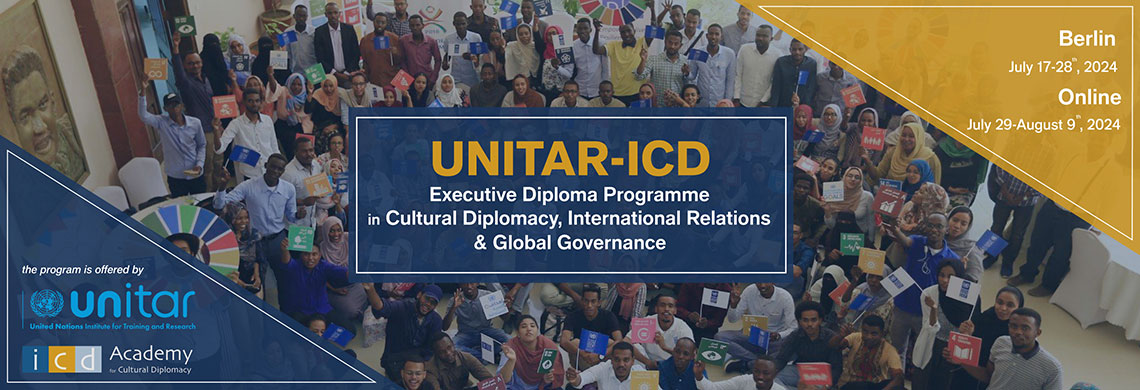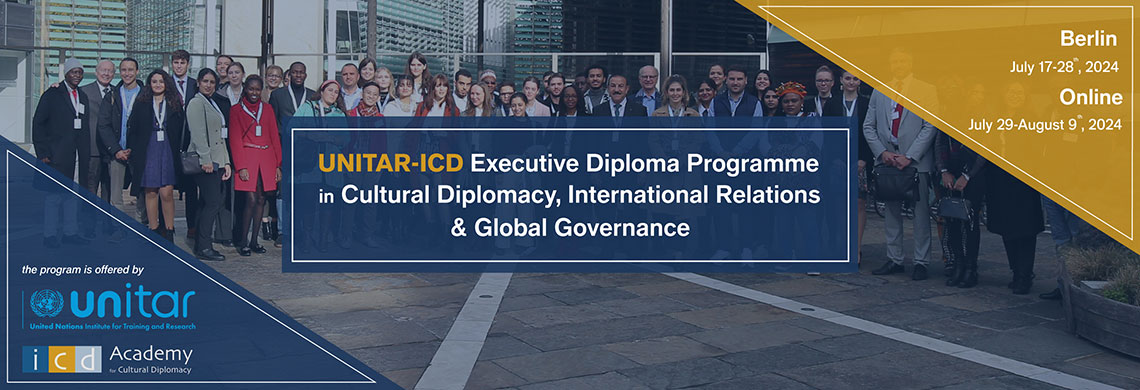UNITAR-ICD Executive Diploma Programme in Cultural Diplomacy, International Relations & Global Governance
Professional Development Program in Cultural Diplomacy, International Relations & Global Governance
(Online; November 11th - 21st, 2024)
The Program is offered by |
Introduction
This executive diploma programme is comprised of specialized courses designed to provide participants with a substantial knowledge of Cultural Diplomacy as practiced by global governance institutions and international organizations around the world.
A particular emphasis of the program is Cultural Diplomacy's role in global governance to improve the ways in which the diversity of cultures can properly understand each other and to facilitate cooperation more effectively at the political, economic and cultural levels. The program provides a thorough background in Cultural Diplomacy, using a historical and case study approach, while further accentuating the role and potential of Cultural Diplomacy in strengthening Global Governance, specializes in Global Governance Institutions, more specifically the UN, the EU, and the African Union. The eight modules will be taught over a period of approx. a month, followed by supported research assignment to be submitted within the framework of three months. The final certificate will be awarded upon submission and evaluation of a final research paper. The format of the programme is hybrid with a possibility to participate in an in-person 10-12 days in Berlin or concluding all courses online.
Content and Structure
UNITAR and ICD propose one programme that will allow participants to benefit from the different modalities and workshops from UNITAR and ICD’s experts. UNITAR will provide support for the programme by organising workshops for all participants. The programme contains eight (8) modules, from which UNITAR will organize four (4). The programmes will be held in a blended format both synchronous and asynchronous. All UNITAR modules will be on a virtual platform.
ICD will provide the 4 following modules:
Module 1: History and Evolution of the field of Cultural Diplomacy
The course provides a comprehensive overview of the theory, modules, history, and evolution of cultural diplomacy as a type of activity based on the cultural exchange between peoples and nations. This course provides an analysis and lays the basis for an understanding of the definitions and modules of cultural diplomacy and how cultural diplomacy works. The historical context of various cultural diplomacy attempts is presented (for both successful and unsuccessful experiences), as well as how various agents (such as State Actors, Non- State Actors, and Global Governance Institutions) and the different tools (such as the arts, music, sports, media, religion & interfaith dialogue) played a role in these attempts.
Module 2: International Case studies in applied Cultural Diplomacy
The course will provide participants with an understanding of contemporary approaches to cultural diplomacy and how the applications of cultural diplomacy differ across the world. The course will include various case studies, a diverse array of cultural diplomacy strategies that can be applied in different settings and contexts around the world, both in the framework of bilateral relations as well as multilateral relations. The course will analyse case studies of the practice of cultural diplomacy in the public sector, private sector, and civil society around the world. Participants will analyse these case studies with a particular focus on target audience, methods, timescale, actors, organizations and aims, using empirical techniques. The course will consider the external factors that contribute towards a country’s approach to cultural diplomacy such as the political culture, geo-strategic location, economic structure, history foreign policy goals and priorities.
Module 3: Future trends in International Relations & Cultural Diplomacy
This course will analyse the extent to which the process of globalization will influence the future conduct of cultural diplomacy & International Relations and will explore what role cultural diplomacy can play in a dramatically changing world, taking into account e.g., globalization, geopolitical changes, climate change, world population increase, increasing inequalities between rich and poor, and global efforts to achieve a sustainable development. Participants will reflect and analyse on how the future trends in cultural diplomacy are linked to issues such as globalization, multiculturalism & interdependence, global governance as well as critically assess new forms of cultural diplomacy for the public sector, the private sector and civil society.
Module 4: Global Governance
The Course will Introduce to the students the Global Governance Concept, various Methods and Agendas developed for this purpose. This course provides an overview of current scholarly debates relating to the interdisciplinary study of global governance in the context of globalization. It examines competing perspectives on globalization and global governance and explores the sources and consequences of global power and authority, as well as the key actors, institutions, regimes, and norms of global governance, as practical examples with applications of these concepts will form part of the course. Concepts will be investigated both to help analyze the relative strengths and weaknesses of existing structures and to suggest ways in which alternative forms might advance sustainability, with specific selected topics and global challenges, that are given particular attention, as Trade and CPR, Environment, Security, and Health.
UNITAR will provide the 4 following modules:
Module 5: Introduction to the UN System
This course is designed to provide an overview of the United Nations as well as a historical, political, and analytic framework to equip participants to better understand the structural elements of the UN system, including the UN Charter and the institutional structure of the UN. Participants will complete the course with a concrete understanding of the legal basis and the current budgetary procedures.
Module 6: Introduction to the Human Rights Institutions
The course provides participants with a fundamental understanding of key definitions and concepts, as well as an overview of the main UN bodies and human rights mechanisms. It focuses on how to engage with the UN bodies and play a strategic role within the human rights mechanisms. The course examines the Special Procedures and the role of the Treaty Bodies.
Module 7: Crisis Management
The goal of the course in Crisis Management is to provide participants with an understanding of the fundamental theories for team leaders to identify the roles and responsibilities during a crisis and to equip participants with the skills necessary to successfully build resilience while leading and supporting their teams. Participants will have the opportunity to acquire leadership skills that are transferable to a variety of contexts and are clear enough for anyone, regardless of their prior experience, to comprehend.
Module 8: Sustainable Development Goals
The course aims to build the capacity and the understanding of participants within the framework of the UN 2030 Agenda exploring the 17 goals. These goals strive to work towards sustainable economic, social, and environmental development on a global scale. The course aims to give a general understanding of the impact of SDGs and implementation strategies on an international level.
Certification
Upon successful completion of the UNITAR-ICD Executive Diploma Programme in Cultural Diplomacy, International Relations & Global Governance will receive an UNITAR-ICD Certificate.





